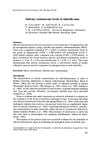13 citations,
April 2019 in “International journal of molecular sciences” Acyzol could help treat conditions caused by zinc deficiency.
 49 citations,
November 2019 in “Egyptian Journal of Medical Human Genetics”
49 citations,
November 2019 in “Egyptian Journal of Medical Human Genetics” Certain gene variants may contribute to high androgen levels in women with polycystic ovary syndrome.
 24 citations,
October 1994 in “Fertility and Sterility”
24 citations,
October 1994 in “Fertility and Sterility” People with hair loss may have different levels of certain hormones due to changes in hormone processing.
1 citations,
January 2019 in “Journal of Research in Medical Sciences” Fewer GGC sequences in the androgen receptor gene improve finasteride treatment for hair loss.
 1 citations,
January 2020 in “Elsevier eBooks”
1 citations,
January 2020 in “Elsevier eBooks” Forensic medicine is crucial for justice and needs continuous innovation and technology integration.
 15 citations,
February 2011 in “Journal of Tissue Engineering and Regenerative Medicine”
15 citations,
February 2011 in “Journal of Tissue Engineering and Regenerative Medicine” The best method for transplanting skin cells to regenerate hair follicles is the Hemi-vascularized sandwich method, as it produces more mature follicles and promotes hair growth.
 December 2024 in “Journal of the International Society of Sports Nutrition”
December 2024 in “Journal of the International Society of Sports Nutrition” Creatine monohydrate is safe and effective for muscle recovery and performance, especially for those with low creatine levels.
 4 citations,
August 2016 in “Australasian Journal of Dermatology”
4 citations,
August 2016 in “Australasian Journal of Dermatology” Hair loss is linked to insulin resistance in women, regardless of hormone levels.
 183 citations,
January 1987 in “British Journal of Anaesthesia”
183 citations,
January 1987 in “British Journal of Anaesthesia” Opioid painkillers can cause many side effects, including breathing problems and addiction, but are generally considered safe when used properly.

Androgenetic alopecia is not linked to higher risks of hypertension or hyperaldosteronism.
 66 citations,
October 2013 in “Current Opinion in Endocrinology, Diabetes and Obesity”
66 citations,
October 2013 in “Current Opinion in Endocrinology, Diabetes and Obesity” The conclusion is that published guidelines are improving transgender medical care, but more research and education in transgender medicine are needed.
 33 citations,
November 2012 in “Journal of The American Academy of Dermatology”
33 citations,
November 2012 in “Journal of The American Academy of Dermatology” FPHL common in Taiwanese women; risk factors include BMI, high glucose, early puberty, fewer childbirths, oral contraceptives, and UV exposure.
25 citations,
May 2017 in “InTech eBooks” Catalytic antibodies are early indicators and active participants in the development of systemic lupus erythematosus.
 16 citations,
December 2010 in “European Journal of Obstetrics & Gynecology and Reproductive Biology”
16 citations,
December 2010 in “European Journal of Obstetrics & Gynecology and Reproductive Biology” Normal levels for certain hormones in Chinese women of reproductive age were identified.
 December 2023 in “Y Dược học”
December 2023 in “Y Dược học” Older adults in Vietnam often experience hair loss after COVID-19, especially women, singles, and those hospitalized.
 September 2017 in “Majallah-i taḥqīqāt-i ̒ulūm-i pizishkī-i Zāhidān”
September 2017 in “Majallah-i taḥqīqāt-i ̒ulūm-i pizishkī-i Zāhidān” Androgenetic alopecia is a long-term, immune-related disorder that starts during puberty due to androgen secretion, and it might be improved with iron tablets, platelet transfusion, and anti-inflammation therapy.
 359 citations,
September 2017 in “European Journal of Epidemiology”
359 citations,
September 2017 in “European Journal of Epidemiology” The Rotterdam Study updated findings on elderly health, focusing on heart disease, genetics, lifestyle effects, and disease understanding.
 125 citations,
January 1999 in “Drugs”
125 citations,
January 1999 in “Drugs” Finasteride effectively treats baldness but may cause sexual side effects.
 5 citations,
August 1987 in “Andrology”
5 citations,
August 1987 in “Andrology” Men with low or no sperm count have lower salivary testosterone levels, and saliva testing can measure their testosterone well.
 May 2018 in “Más dermatología”
May 2018 in “Más dermatología” The higher dose supplement was more effective in treating female hair loss.
 January 2024 in “Biology of sex differences”
January 2024 in “Biology of sex differences” Dihydrotestosterone makes arteries stiffer in female mice by reducing estrogen receptor expression.
36 citations,
December 2014 in “F1000 prime reports” The document concludes that Hidradenitis suppurativa is often underdiagnosed, lacks definitive treatment, and requires better awareness and management strategies.
 19 citations,
April 2020 in “Psychological Medicine”
19 citations,
April 2020 in “Psychological Medicine” The study found three different timing patterns of symptoms in women with premenstrual dysphoric disorder.
February 2024 in “Animals” Hair loss peaks in spring and regrowth in late summer, with pregnant females losing the most hair.
 12 citations,
March 2017 in “Journal of obstetrics and gynaecology Canada”
12 citations,
March 2017 in “Journal of obstetrics and gynaecology Canada” Testosterone therapy can modestly improve sexual function in menopausal women but should be used cautiously and is not recommended for routine measurement in sexual dysfunction or hirsutism.
 January 2018 in “Springer eBooks”
January 2018 in “Springer eBooks” Gender affects hair and scalp characteristics, with differences in hormone responses, graying patterns, and trace metals.
 17 citations,
August 1967 in “JAMA”
17 citations,
August 1967 in “JAMA” The rapid corticotropin test is a quick and simple way to diagnose adrenal insufficiency.
 26 citations,
September 2012 in “Epilepsy & Behavior”
26 citations,
September 2012 in “Epilepsy & Behavior” Finasteride worsens seizures in epilepsy rats and speeds up epileptogenesis in mice.
 64 citations,
August 1999 in “The American journal of medicine”
64 citations,
August 1999 in “The American journal of medicine” The transscrotal testosterone patch normalizes hormone levels in men with AIDS and weight loss but does not improve weight, body mass, or quality of life.
12 citations,
February 2017 in “Journal of neuroscience research” Removing certain brain receptors in mice worsens seizure severity and response to treatment during hormone withdrawal.























